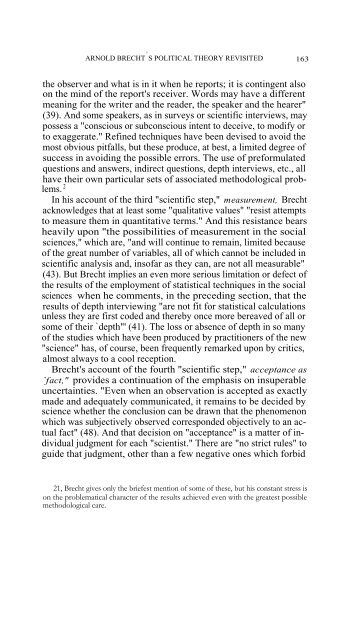ARNOLD BRECHT'S POLITICAL THEORY REVISITED Political ...
ARNOLD BRECHT'S POLITICAL THEORY REVISITED Political ...
ARNOLD BRECHT'S POLITICAL THEORY REVISITED Political ...
You also want an ePaper? Increase the reach of your titles
YUMPU automatically turns print PDFs into web optimized ePapers that Google loves.
<strong>ARNOLD</strong> BRECHT ' S <strong>POLITICAL</strong> <strong>THEORY</strong> <strong>REVISITED</strong> 163<br />
the observer and what is in it when he reports; it is contingent also<br />
on the mind of the report's receiver. Words may have a different<br />
meaning for the writer and the reader, the speaker and the hearer"<br />
(39). And some speakers, as in surveys or scientific interviews, may<br />
possess a "conscious or subconscious intent to deceive, to modify or<br />
to exaggerate." Refined techniques have been devised to avoid the<br />
most obvious pitfalls, but these produce, at best, a limited degree of<br />
success in avoiding the possible errors. The use of preformulated<br />
questions and answers, indirect questions, depth interviews, etc., all<br />
have their own particular sets of associated methodological problems.<br />
2<br />
In his account of the third "scientific step," measurement, Brecht<br />
acknowledges that at least some "qualitative values" "resist attempts<br />
to measure them in quantitative terms." And this resistance bears<br />
heavily upon "the possibilities of measurement in the social<br />
sciences," which are, "and will continue to remain, limited because<br />
of the great number of variables, all of which cannot be included in<br />
scientific analysis and, insofar as they can, are not all measurable"<br />
(43). But Brecht implies an even more serious limitation or defect of<br />
the results of the employment of statistical techniques in the social<br />
sciences when he comments, in the preceding section, that the<br />
results of depth interviewing "are not fit for statistical calculations<br />
unless they are first coded and thereby once more bereaved of all or<br />
some of their `depth"' (41). The loss or absence of depth in so many<br />
of the studies which have been produced by practitioners of the new<br />
"science" has, of course, been frequently remarked upon by critics,<br />
almost always to a cool reception.<br />
Brecht's account of the fourth "scientific step," acceptance as<br />
`fact," provides a continuation of the emphasis on insuperable<br />
uncertainties. "Even when an observation is accepted as exactly<br />
made and adequately communicated, it remains to be decided by<br />
science whether the conclusion can be drawn that the phenomenon<br />
which was subjectively observed corresponded objectively to an actual<br />
fact" (48). And that decision on "acceptance" is a matter of individual<br />
judgment for each "scientist." There are "no strict rules" to<br />
guide that judgment, other than a few negative ones which forbid<br />
21, Brecht gives only the briefest mention of some of these, but his constant stress is<br />
on the problematical character of the results achieved even with the greatest possible<br />
methodological care.
















